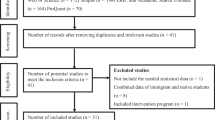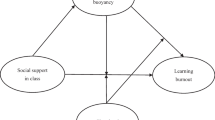Abstract
According to family investment theory, a family’s socio-economic status can have a noteworthy impact on the academic performance and future lives of adolescents. However, the mechanism for this remains poorly understood. We examined the mediating and moderating effects of family emotional and cultural environment on the relations between family socio-economic status and learning burnout. Specifically, we investigated whether different family emotional environments have a moderating effect on the relationship between family socio-economic status and learning burnout and on the mediating effect of family cultural environment. A sample of 1181 junior and senior high school students completed multidimensional measures of family socioeconomic status, family emotional and cultural environment, and learning burnout. A regression analysis showed that socio-economic status significantly predicted learning burnout. The achievement, cultural, and recreational dimensions of family cultural environment were all mediators of this relationship. Moreover, cultural dimension was moderated by the family conflicts factor of family emotional environment.

Similar content being viewed by others
References
Ackerman, B. P., Brown, E. D., & Izard, C. E. (2004). The relations between persistent poverty and contextual risk and children’s behavior in elementary school. Developmental Psychology, 40(3), 367–377.
Baron, R. M., & Kenny, D. A. (1986). The moderator–mediator variable distinction in social psychological research: Conceptual, strategic, and statistical considerations. Journal of Personality and Social Psychology, 51(6), 1173.
Bradley, R. H., & Corwyn, R. F. (2002). Socioeconomic status and child development. Annual Review of Psychology, 53(1), 371–399.
Burchinal, M., Vernon-Feagans, L., Cox, M., & Key Family Life Project. (2008). Cumulative social risk, parenting, and infant development in rural low-income communities. Parenting Science Practice, 8(1), 41–69.
Caldas, S. J., & Bankston, C. (1997). Effect of school population socioeconomic status on individual academic achievement. The Journal of Educational Research, 90(5), 269–277.
Caro, D. H., McDonald, J. T., & Willms, J. D. (2009). Socio-economic status and academic achievement trajectories from childhood to adolescence. Canadian Journal of Education/Revue canadienne de l’éducation, 32(3), 558–590.
Conger, R. D., & Donnellan, M. B. (2007). An interactionist perspective on the socioeconomic context of human development. Annual Review Psychology, 58, 175–199.
Crosnoe, R., Augustine, J. M., & Huston, A. C. (2012). Children’s early child care and their mothers’ later involvement with schools. Children Development, 83, 758–772.
Davis-Kean, P. E. (2005). The influence of parent education and family income on child achievement: the indirect role of parental expectations and the home environment. Journal of Family Psychology, 19(2), 294–304.
Evans, G. W., & English, K. (2002). The environment of poverty: Multiple stressor exposure, psychophysiological stress, and socioemotional adjustment. Children Development, 73(4), 1238–1248.
Evans, G. W., & Kim, P. (2007). Childhood poverty and health cumulative risk exposure and stress dysregulation. Psychological Science, 18(11), 953–957.
Fei, L. P., Shen, Q. J., Zheng, Y. P., Zhao, J. P., Wang, L. W., & Wang, X. D. (1991). A comparison of normal family and schizophrenia family by using “Family intimacy and adaptability scale” and “Family environment scale”. Chinese Mental Health Journal, 5, 198–203. (In Chinese).
Frydenberg, E., Lewis, R., Bugalski, K., Cotta, A., McCarthy, C., Luscombe-Smith, N., & Poole, C. (2004). Prevention is better than cure: Coping skills training for adolescents at school. Educational Psychology in Practice, 20(2), 117–134.
Gershoff, E. T., Aber, J. L., Raver, C. C., & Lennon, M. C. (2007). Income is not enough: incorporating material hardship into models of income associations with parenting and child development. Children Development, 78(1), 70–95.
Haifeng, L. (2015). The college entrance examination in China. International Higher Education, 68(2), 23–25.
Hanson, M. D., & Chen, E. (2007). Socioeconomic status and health behaviors in adolescence: A review of the literature. Journal Behavior Medicine, 30(3), 263–285.
Huebner, E. S., Drane, W., & Valois, R. F. (2000). Levels and demographic correlates of adolescent life satisfaction reports. School Psychology International, 21(3), 281–292.
Jeynes, W. H. (2002). Examining the effects of parental absence on the academic achievement of adolescents: The challenge of controlling for family income. Journal of Family and Economic Issues, 23(2), 189–210.
Malecki, C. K., & Demaray, M. K. (2006). Social support as a buffer in the relationship between socioeconomic status and academic performance. School Psychology Quarterly, 21(4), 375–395.
Matthews, K. A., & Gallo, L. C. (2011). Psychological perspectives on pathways linking socioeconomic status and physical health. Annual Review of Psychology, 62, 501–530.
McMunn, A. M., Nazroo, J. Y., Marmot, M. G., Boreham, R., & Goodman, R. (2001). Children’s emotional and behavioural well-being and the family environment: Findings from the Health Survey for England. Social Science and Medicine, 53(4), 423–440.
Mistry, R. S., Biesanz, J. C., Taylor, L. C., Burchinal, M., & Cox, M. J. (2004). Family income and its relation to preschool children’s adjustment for families in the NICHD study of early child care. Developmental Psychology, 40(5), 727–745.
Muller, D., Judd, C. M., & Yzerbyt, V. Y. (2005). When moderation is mediated and mediation is moderated. Journal of Personality and Social Psychology, 89(6), 852–863.
Najman, J. M., Behrens, B. C., Andersen, M., Bor, W., O’Callaghan, M., & Williams, G. M. (1997). Impact of family type and family quality on child behavior problems: A longitudinal study. Journal of the American Academy of Child and Adolescent Psychiatry, 36(10), 1357–1365.
Okpala, C. O., Smith, F., Jones, E., & Ellis, R. (2000). A clear link between school and teacher characteristics, student demographics, and student achievement. Education, 120(3), 487.
Preacher, K. J., & Hayes, A. F. (2004). SPSS and SAS procedures for estimating indirect effects in simple mediation models. Behavior Research Methods, Instruments, & Computers, 36(4), 717–731.
Randolph, K. A., Fraser, M. W., & Orthner, D. K. (2006). A strategy for assessing the impact of time-varying family risk factors on high school dropout. Journal of Family Issues, 27(7), 933–950.
Rudolph, K. D., Lambert, S. F., Clark, A. G., & Kurlakowsky, K. D. (2001). Negotiating the transition to middle school: the role of self-regulatory processes. Child Development, 72(3), 929–946.
Salmela-Aro, K., Kiuru, N., Leskinen, E., & Nurmi, J. E. (2009). School burnout inventory (SBI) reliability and validity. European Journal of Psychological Assessment, 25(1), 48–57.
Schaufeli, W. B., Salanova, M., González-Romá, V., & Bakker, A. B. (2002). The measurement of engagement and burnout: A two sample confirmatory factor analytic approach. Journal of Happiness Studies, 3(1), 71–92.
Schöllgen, I., Huxhold, O., Schüz, B., & Tesch-Römer, C. (2011). Resources for health: Differential effects of optimistic self-beliefs and social support according to socioeconomic status. Health Psychology, 30(3), 326–335.
Shi, B. G., & Shen, J. L. (2007). Relationship between creativity and family socioeconomic status, intelligence and internal motivation. Psychological Development and Education, 23, 30–34. (In Chinese).
Sirin, S. R. (2005). Socioeconomic status and academic achievement: A meta-analytic review of research. Review of Educational Research, 75(3), 417–453.
Smith, J. R., Brooks-Gunn, J., & Klebanov, P. K. (1997). Consequences of living in poverty for young children’s cognitive and verbal ability and early school achievement. In G. J. Duncan & J. Brooks-Gunn (Eds.), Consequences of growing up poor (pp. 132–189). New York, NY: Russell Sage Foundation.
Terenzini, P. T., Cabrera, A. F., & Bernal, E. M. (2001). Swimming against the tide: The poor in American higher education (College Board Research Report No. 2001-1). New York, NY: College Entrance Examination Board.
Tuominen-Soini, H., & Salmela-Aro, K. (2014). Schoolwork engagement and burnout among Finnish high school students and young adults: profiles, progressions, and educational outcomes. Developmental Psychology, 50(3), 649–662.
Vasalampi, K., Salmela-Aro, K., & Nurmi, J.-E. (2009). Adolescents’ self-concordance, school engagement, and burnout predict their educational trajectories. European Psychologist, 14(4), 332–341.
Waanders, C., Mendez, J. L., & Downer, J. T. (2007). Parent characteristics, economic stress and neighborhood context as predictors of parent involvement in preschool children’s education. Journal of School Psychology, 45(6), 619–636.
Zhang, X., Chen, H. C., Zhang, Y. N., & Sun, B. H. (2009). Mesomeric effect and regulating effect: Family incomes and children’s early social ability. Acta Psychologica Sinica, 7, 613–623.
Zheng, R. (2008). Chinese college entrance examination: Review of discussions and the value orientation of reforms. Frontiers of education in China, 3(1), 137–148.
Zheng, R. (2009). College entrance examination as a scapegoat: Phenomenon and its essence. Fudan Education Forum, 7(2), 22–25. (In Chinese).
Author information
Authors and Affiliations
Corresponding author
Rights and permissions
About this article
Cite this article
Luo, Y., Wang, Z., Zhang, H. et al. The Influence of Family Socio-economic Status on Learning Burnout in Adolescents: Mediating and Moderating Effects. J Child Fam Stud 25, 2111–2119 (2016). https://doi.org/10.1007/s10826-016-0400-2
Published:
Issue Date:
DOI: https://doi.org/10.1007/s10826-016-0400-2




